
- DONATE
- SPONSOR A CHILD
- Zakat calculator
- SIGN IN
-
- About Us
- FAQ's
- Contact
- Get Involved
- Admissions
- Sign In
- SPONSOR A CHILD ZAKAT CALCULATOR DONATE
-
info@pakistansweethome.org.pk
(051) 4865856
+92 335 1118477
What happens when love turns into leniency?
In today’s parenting culture, many moms and dads focus on keeping their children happy at all costs. They avoid conflict, skip discipline, and let kids call the shots—believing it builds confidence and closeness.
This parenting style, known as permissive parenting, may seem harmless at first. But without clear limits, children may struggle with discipline, self-control, and decision-making later in life.
Let’s dive into what permissive parenting is and how to find a healthier balance.
Permissive parents are warm and positive, allowing children to make choices with minimal restrictions or consequences. They step in when needed but generally provide little structure, fostering an environment of freedom. Children growing up in permissive households quickly realize they are loved and have the freedom to act as they wish.
This parenting style isn't always intentional; many permissive parents avoid setting rules because it feels like a hassle. Research shows that permissive parents often act selfishly, desiring fun and ease over strict discipline.
Diana Baumrind, a developmental psychologist, defines permissive parents as having low expectations for behavior or achievement. However, they lavish their children with attention and affirmation when the child seeks it.
Permissive parenting is marked by warmth and minimal rules or demands. This type of parenting differs from others due to its lenient attitude and low expectations for discipline. These parents focus on warmth and responsiveness but often lack consistency and discipline.
Here are its core characteristics:
Following are the causes behind permissive parenting and why some parents choose this approach.
Permissive parents tend to be lenient and indulgent, offering minimal structure and few responsibilities to their children. As Dr. Meghan Downey, a licensed clinical psychologist, explains, "They often position themselves more as a 'friend' than a parent."
While this approach may seem to foster independence, it can have negative consequences. Parents are role models, and they might believe that allowing kids to act freely will encourage self-reliance. Without proper guidance, children may make poor choices that harm their long-term confidence and growth.
Some of the most common effects include:
Permissive parenting comes with its benefits. Parents who adopt this style are often emotionally supportive and in tune with their children's needs. In a world filled with growing pressures on kids, households with fewer expectations can offer a refreshing sense of ease.
These parents may also experience less stress themselves. By relying on their instincts and doing what feels right, permissive parents are less likely to feel guilt or shame about their choices. Here are some additional advantages of this parenting approach.
Here are some common examples of permissive parenting:
"It's easier to just give them the candy now than deal with the meltdown later."
The parent avoids conflict by giving in to the child’s demands, prioritizing peace over consistency.
"They’re not tired yet, so why force them to go to bed? Let them stay up."
The parent neglects the need for structure by allowing the child to stay up without a set bedtime.
"I don’t want to be too harsh on them; they’ll figure it out on their own eventually."
The parent avoids discipline, believing the child will learn lessons naturally without intervention.
"I just wanted to end the crying, so I bought them the toy. They’re happier now."
The parent gives in to a tantrum, reinforcing the behavior that throwing a fit leads to rewards.
"I don’t want to restrict them too much. They should have the freedom to do whatever they want."
The parent avoids imposing limits, thinking that freedom will foster independence despite the need for boundaries.
"I don’t want to upset them by correcting their behavior. I just want us to get along."
The parent avoids correction to preserve harmony, often neglecting the child’s need for guidance.
"I let them choose because it’s their day, and they should have a say in what we do.”
The parent allows the child to make decisions, over-emphasizing autonomy and neglecting parental guidance.
"I just want to spoil them a little. They deserve the toys and treats, even without earning them."
The parent overindulges the child with material rewards, reinforcing the idea that they should get things without effort.
"It’s just one bad report card. I don’t want to make a big deal out of it."
The parent downplays academic issues, not addressing the need for accountability or improvement.
"The teacher isn’t doing enough to help them, or their friends are a bad influence. It’s not their fault."
The parent shifts blame to external factors, avoiding responsibility and not teaching the child accountability.
Permissive parenting is one of the four primary parenting styles, alongside Authoritarian, Authoritative, and Uninvolved parenting. The main distinction between these styles lies in the balance between responsiveness and demandingness.
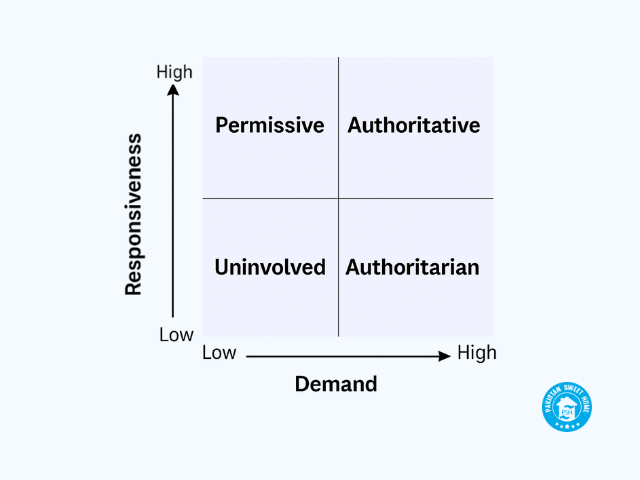
In permissive parenting, there is a high level of responsiveness (attentiveness to children's emotional needs) but low demandingness (few rules or expectations). In comparison, each style emphasizes these two aspects differently, shaping how parents interact with and discipline their children.
Permissive parenting features low demands but high responsiveness, while authoritarian parenting, often referred to as helicopter parenting, is characterized by high demands and low responsiveness.
Authoritarian parents impose strict rules without taking their child's opinions into account, which can result in rebellion and long-term mental health issues. Although they may have good intentions, they often lack an emotional connection.
Both permissive and uninvolved parenting share low demands, but uninvolved parenting also has low responsiveness, characterized by neglect and emotional detachment. Uninvolved parents focus more on their own needs than their child's, often providing only the necessities. This lack of engagement can lead children to feel neglected.
Authoritative parenting is seen as the ideal style. It combines high responsiveness with high demands. Authoritative parents set boundaries while encouraging independence, validating emotions, and guiding their children to make thoughtful decisions. This approach results in disciplined, sociable children with better mental health and greater success in life.
Shifting your parenting style can be challenging for both you and your child. For you, it may feel like neglect if you start imposing consequences and reducing your responsiveness. For your child, accustomed to a more lenient relationship, they may react with extreme tantrums and increased demands.
It's important to recognize where permissive parenting falls within the quadrant. It is characterized by high responsiveness and low demands. To shift your approach, the key is to raise those low demands to higher expectations.
Here are some strategies to adopt a more authoritative parenting style:
This method involves offering rewards for good behavior and consequences for bad actions.
For example, allow your child to play video games after finishing homework, or take away video games due to poor grades.
While it's important to show love and affection, excessive indulgence can make your child believe they can escape the consequences of their actions. Offering rewards is fine, but spoiling can harm your child's growth. Instead of giving in when your child cries, explain why they can't have what they wants.
Beyond chores, give your child ownership of tasks to teach accountability. When children feel trusted with responsibilities, they gain a sense of accomplishment and self-worth early on.
Set clear, understandable rules, and communicate the consequences for breaking them. Explain why they are in place rather than simply telling your child to follow the rules. Children are more likely to follow rules they understand.
In conclusion, Permissive parenting shows warmth and responsiveness but lacks structure, discipline, and consistent expectations for children. Its effects can include poor self-regulation, low academic achievement, and difficulty respecting boundaries. Avoiding discipline, giving in to tantrums, and excessive freedom show permissive parenting in daily life.
To change permissive parenting, it is essential to introduce consistent rules, assign responsibilities, and reduce overindulgence. Understanding permissive vs. other parenting styles helps choose a balanced, effective approach for child development.
Therapy helps permissive parents by increasing self-awareness and addressing the root causes of their parenting style. It offers practical tools to set boundaries, enforce rules, and manage behavior effectively while maintaining warmth.
Therapists support parents in overcoming guilt or fear about discipline, showing that structure enhances the parent-child bond.
Permissive parenting is relatively uncommon in Pakistan, with studies indicating that only about 13% of parents adopt this style.
In contrast, authoritarian parenting is more prevalent, practiced by approximately 53% of parents, while authoritative parenting accounts for around 34%. This trend reflects cultural norms that emphasize obedience and structured discipline.
Another study focusing on language development found that only 3.1% of parents employed permissive parenting, highlighting its minimal presence in Pakistani households.
Yes, permissive parenting favors freedom over discipline. It emphasizes emotional support and independence but often lacks structure and consistent rules. While children may enjoy autonomy, they miss opportunities to develop self-control, responsibility, and respect for boundaries.
Permissive parenting can contribute to mental health issues in children, though it may not be the sole cause. The lack of structure and guidance can lead to anxiety, depression, and conduct disorders. Inconsistent discipline and unclear boundaries create emotional insecurity, low self-esteem, and behavioral challenges.
No, they are different. While both avoid harsh discipline, permissive parenting lacks rules and boundaries. Gentle parenting, on the other hand, combines empathy with consistent limits and positive discipline.
It encourages respectful guidance, emotional support, and the development of self-regulation through structured interactions.
In permissive parenting, parents are warm and responsive but avoid enforcing rules or setting clear boundaries. They prioritize nurturing and often give their children significant freedom in decision-making.
While this approach can foster a close relationship, it may result in issues with discipline, self-regulation, and respect for authority.

WRITTEN BY
Dr. Ayesha Khan (Child Welfare)
Dr. Ayesha Khan is a dedicated social worker with over 15 years of experience in child welfare and community development. As a passionate advocate for vulnerable children, she has worked tirelessly to create safe and nurturing environments for orphans and underprivileged youth. Dr. Khan holds a PhD in Social Work and has specialized in developing sustainable programs that support the holistic development of children. Through her work at Pakistan Sweet Home, she aims to raise awareness and inspire action through her insightful and compassionate writing.
Dr. Ayesha Khan is a dedicated social worker with over 15 years of experience in child welfare and community development. As a passionate advocate for vulnerable children, she has worked tirelessly to create safe and nurturing environments for orphans and underprivileged youth. Dr. Khan holds a PhD in Social Work and has specialized in developing sustainable programs that support the holistic development of children. Through her work at Pakistan Sweet Home, she aims to raise awareness and inspire action through her insightful and compassionate writing.
Positive Parenting: What It Is and Why It Matters

Gentle Parenting: A Compassionate Approach to Parenting

Gentle Parenting Examples: Lead with Understanding and Calm
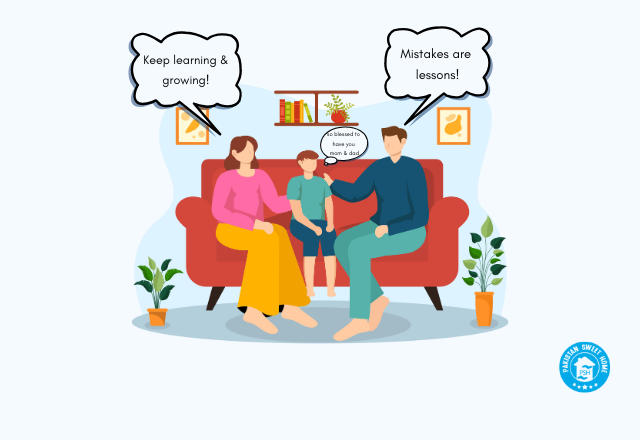
Understanding Authoritative Parenting: Effects & More
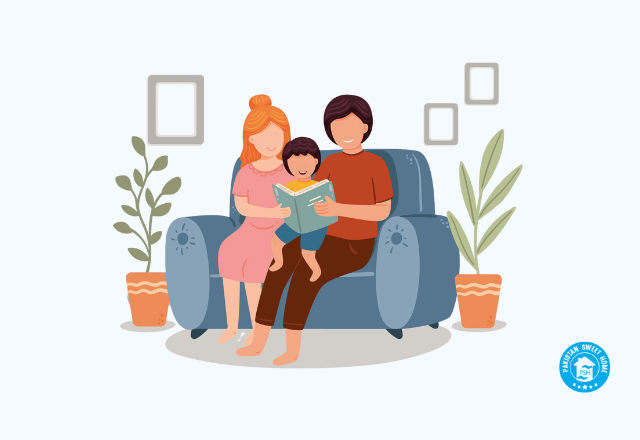
Authoritarian Parenting: What It Is, How It Works, & What to Avoid
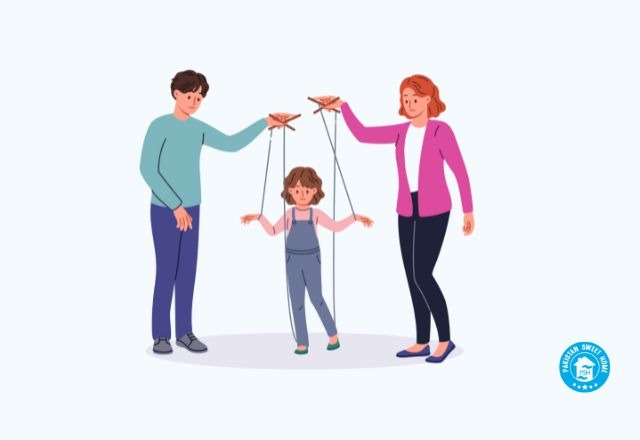
Uninvolved Parenting: Signs, Consequences, and Support Tips

Types of Parenting: Differences, Impact, and Examples
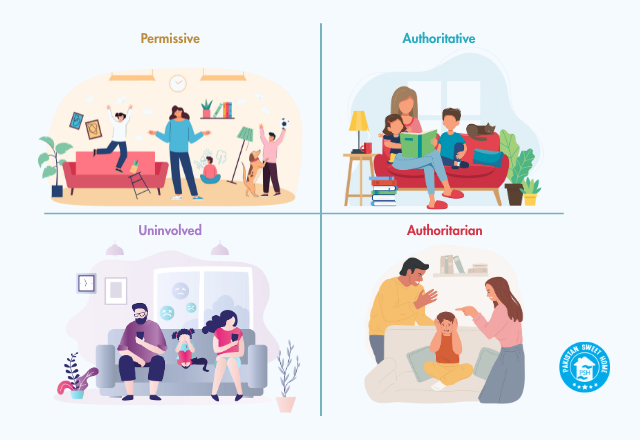
A Comprehensive Guide on Single Parenting
